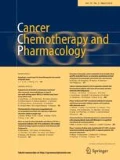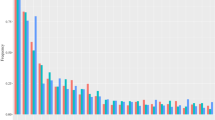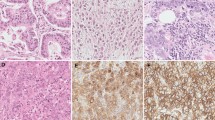Abstract
Purpose
Urothelial carcinoma associated 1 (UCA1) functions as an oncogene, which promotes cancer cell proliferation, invasion, and metastasis, and is responsible for drug resistance. This study aimed to determine the expression level of UCA1 in ovarian cancer and to further investigate its clinical significance.
Methods
The expression levels of UCA1 in ovarian cancer and normal ovaries were determined by quantitative real-time PCR. The relationship between UCA1 expression and clinical features and the prognostic value of UCA1 for overall survival were examined.
Results
UCA1 expression in ovarian cancer tissues was significantly upregulated compared with normal ovarian tissues. High UCA1 expression was related to lymph node metastasis, FIGO stage, and response to chemotherapy. Kaplan–Meier analysis demonstrated that high UCA1 expression was associated with poorer overall survival in patients with ovarian cancer. Cox proportional hazards analysis showed that high UCA1 expression was an independent prognostic marker of poor outcome. This effect remained significant in the further stratification analysis.
Conclusions
Our findings provided the first evidence that UCA1 may serve as an indicator of response to chemotherapy and prognosis of ovarian cancer. UCA1 may play an important role in the progression of ovarian cancer.


Similar content being viewed by others
References
Knutson KL, Karyampudi L, Lamichhane P, Preston C (2015) Targeted immune therapy of ovarian cancer. Cancer Metastasis Rev 34:53–74
Torre LA, Bray F, Siegel RL, Ferlay J, Lortet-Tieulent J, Jemal A (2015) Global cancer statistics, 2012. CA Cancer J Clin 65:87–108
Elgar G, Vavouri T (2008) Tuning into the signals: noncoding sequence conservation in vertebrate genomes. Trends Genet 24:344–352
Zhang X, Xu Y, He C, Guo X, Zhang J, He C, Zhang L, Kong M, Chen B, Zhu C (2015) Elevated expression of CCAT2 is associated with poor prognosis in esophageal squamous cell carcinoma. J Surg Oncol 111:834–839
ENCODE Project Consortium (2007) Identification and analysis of functional elements in 1% of the human genome by the ENCODE pilot project. Nature 447:799–816
Wang KC, Chang HY (2011) Molecular mechanisms of long noncoding RNAs. Mol Cell 43:904–914
Gan L, Xu M, Zhang Y, Zhang X, Guo W (2015) Focusing on long noncoding RNA dysregulation in gastric cancer. Tumour Biol 36:129–141
Guo G, Kang Q, Chen Q, Chen Z, Wang J, Tan L, Chen JL (2014) High expression of long non-coding RNA H19 is required for efficient tumorigenesis induced by Bcr-Abl oncogene. FEBS Lett 588:1780–1786
Harries LW (2012) Long non-coding RNAs and human disease. Biochem Soc Trans 40:902–906
Kitagawa M, Kotake Y, Ohhata T (2012) Long non-coding RNAs involved in cancer development and cell fate determination. Curr Drug Targets 13:1616–1621
Salameh A, Lee AK, Cardo-Vila M, Nunes DN, Efstathiou E, Staquicini FI, Dobroff AS, Marchio S, Navone NM, Hosoya H, Lauer RC, Wen S, Salmeron CC, Hoang A, Newsham I, Lima LA, Carraro DM, Oliviero S, Kolonin MG, Sidman RL, Do KA, Troncoso P, Logothetis CJ, Brentani RR, Calin GA, Cavenee WK, Dias-Neto E, Pasqualini R, Arap W (2015) PRUNE2 is a human prostate cancer suppressor regulated by the intronic long noncoding RNA PCA3. Proc Natl Acad Sci USA 112:8403–8408
Zheng Q, Wu F, Dai WY, Zheng DC, Zheng C, Ye H, Zhou B, Chen JJ, Chen P (2015) Aberrant expression of UCA1 in gastric cancer and its clinical significance. Clin Transl Oncol 17:640–646
Morlando M, Ballarino M, Fatica A (2015) Long non-coding RNAs: new players in hematopoiesis and leukemia. Front Med (Lausanne) 2:23
Yang C, Li X, Wang Y, Zhao L, Chen W (2012) Long non-coding RNA UCA1 regulated cell cycle distribution via CREB through PI3-K dependent pathway in bladder carcinoma cells. Gene 496:8–16
Wang F, Ying HQ, He BS, Pan YQ, Deng QW, Sun HL, Chen J, Liu X, Wang SK (2015) Upregulated lncRNA-UCA1 contributes to progression of hepatocellular carcinoma through inhibition of miR-216b and activation of FGFR1/ERK signaling pathway. Oncotarget 6:7899–7917
Wang HM, Lu JH, Chen WY, Gu AQ (2015) Upregulated lncRNA-UCA1 contributes to progression of lung cancer and is closely related to clinical diagnosis as a predictive biomarker in plasma. Int J Clin Exp Med 8:11824–11830
Wang F, Li X, Xie X, Zhao L, Chen W (2008) UCA1, a non-protein-coding RNA up-regulated in bladder carcinoma and embryo, influencing cell growth and promoting invasion. FEBS Lett 582:1919–1927
Tsang WP, Wong TW, Cheung AH, Co CN, Kwok TT (2007) Induction of drug resistance and transformation in human cancer cells by the noncoding RNA CUDR. RNA 13:890–898
Xue M, Li X, Li Z, Chen W (2014) Urothelial carcinoma associated 1 is a hypoxia-inducible factor-1alpha-targeted long noncoding RNA that enhances hypoxic bladder cancer cell proliferation, migration, and invasion. Tumour Biol 35:6901–6912
Han Y, Yang YN, Yuan HH, Zhang TT, Sui H, Wei XL, Liu L, Huang P, Zhang WJ, Bai YX (2014) UCA1, a long non-coding RNA up-regulated in colorectal cancer influences cell proliferation, apoptosis and cell cycle distribution. Pathology 46:396–401
Wang F, Zhou J, Xie X, Hu J, Chen L, Hu Q, Guo H, Yu C (2015) Involvement of SRPK1 in cisplatin resistance related to long non-coding RNA UCA1 in human ovarian cancer cells. Neoplasma 62:432–438
Therasse P, Arbuck SG, Eisenhauer EA, Wanders J, Kaplan RS, Rubinstein L, Verweij J, Van Glabbeke M, van Oosterom AT, Christian MC, Gwyther SG (2000) New guidelines to evaluate the response to treatment in solid tumors. European Organization for Research and Treatment of Cancer, National Cancer Institute of the United States, National Cancer Institute of Canada. J Natl Cancer Inst 92:205–216
Ma MZ, Chu BF, Zhang Y, Weng MZ, Qin YY, Gong W, Quan ZW (2015) Long non-coding RNA CCAT1 promotes gallbladder cancer development via negative modulation of miRNA-218-5p. Cell Death Dis 6:e1583
Fang Z, Wu L, Wang L, Yang Y, Meng Y, Yang H (2014) Increased expression of the long non-coding RNA UCA1 in tongue squamous cell carcinomas: a possible correlation with cancer metastasis. Oral Surg Oral Med Oral Pathol Oral Radiol 117:89–95
Tian Y, Zhang X, Hao Y, Fang Z, He Y (2014) Potential roles of abnormally expressed long noncoding RNA UCA1 and Malat-1 in metastasis of melanoma. Melanoma Res 24:335–341
Wang T, Yuan J, Feng N, Li Y, Lin Z, Jiang Z, Gui Y (2014) Hsa-miR-1 downregulates long non-coding RNA urothelial cancer associated 1 in bladder cancer. Tumour Biol 35:10075–10084
Liu SP, Yang JX, Cao DY, Shen K (2013) Identification of differentially expressed long non-coding RNAs in human ovarian cancer cells with different metastatic potentials. Cancer Biol Med 10:138–141
Xue M, Li X, Wu W, Zhang S, Wu S, Li Z, Chen W (2014) Upregulation of long non-coding RNA urothelial carcinoma associated 1 by CCAAT/enhancer binding protein alpha contributes to bladder cancer cell growth and reduced apoptosis. Oncol Rep 31:1993–2000
Wang X, Gong Y, Jin B, Wu C, Yang J, Wang L, Zhang Z, Mao Z (2014) Long non-coding RNA urothelial carcinoma associated 1 induces cell replication by inhibiting BRG1 in 5637 cells. Oncol Rep 32:1281–1290
Xu Y, Pan Q, Wang C, He C, Su Z, Guo X, Zhang J, Kong M, Ke S, Zhang J, Chen B, Sheng H, Zhang X (2014) Genetic polymorphisms in oxidative stress-related genes are associated with clinical outcome in patients with advanced non-small cell lung cancer receiving tyrosine kinase inhibitors. Am J Cancer Res 4:934–942
Li HJ, Li X, Pang H, Pan JJ, Xie XJ, Chen W (2015) Long non-coding RNA UCA1 promotes glutamine metabolism by targeting miR-16 in human bladder cancer. Jpn J Clin Oncol 45:1055–1063
Fan Y, Shen B, Tan M, Mu X, Qin Y, Zhang F, Liu Y (2014) Long non-coding RNA UCA1 increases chemoresistance of bladder cancer cells by regulating Wnt signaling. FEBS J 281:1750–1758
Cheng N, Cai W, Ren S, Li X, Wang Q, Pan H, Zhao M, Li J, Zhang Y, Zhao C, Chen X, Fei K, Zhou C, Hirsch FR (2015) Long non-coding RNA UCA1 induces non-T790 M acquired resistance to EGFR-TKIs by activating the AKT/mTOR pathway in EGFR-mutant non-small cell lung cancer. Oncotarget 6:23582–23593
Acknowledgments
This work was supported by the Taizhou Science and Technology Agency, Zhejiang, China (Grant No. 131KY14-04), the Department of Science and Technology of Zhejiang Province, China (Grant No. 2014C33154), and the ‘New 100 Talents Project’ of Shanghai Municipal Public Health Bureau, China (Grant No. XBR2013124).
Author information
Authors and Affiliations
Corresponding authors
Ethics declarations
Conflict of interest
All authors declare no conflict of interests.
Additional information
Ling Zhang and Xili Cao have contributed equally to this work.
Rights and permissions
About this article
Cite this article
Zhang, L., Cao, X., Zhang, L. et al. UCA1 overexpression predicts clinical outcome of patients with ovarian cancer receiving adjuvant chemotherapy. Cancer Chemother Pharmacol 77, 629–634 (2016). https://doi.org/10.1007/s00280-016-2963-4
Received:
Accepted:
Published:
Issue Date:
DOI: https://doi.org/10.1007/s00280-016-2963-4




